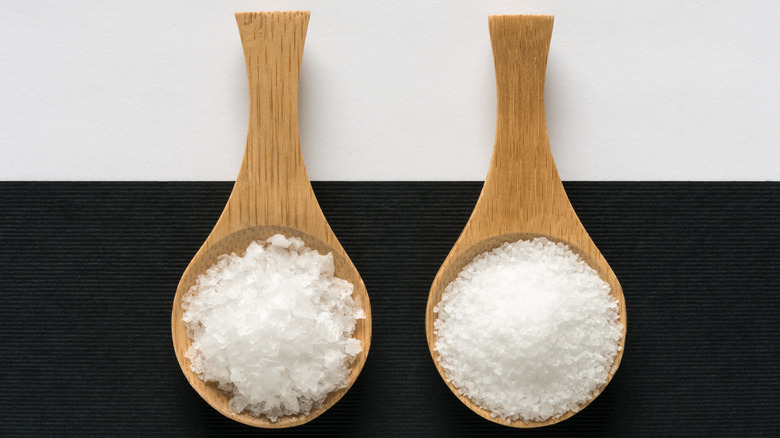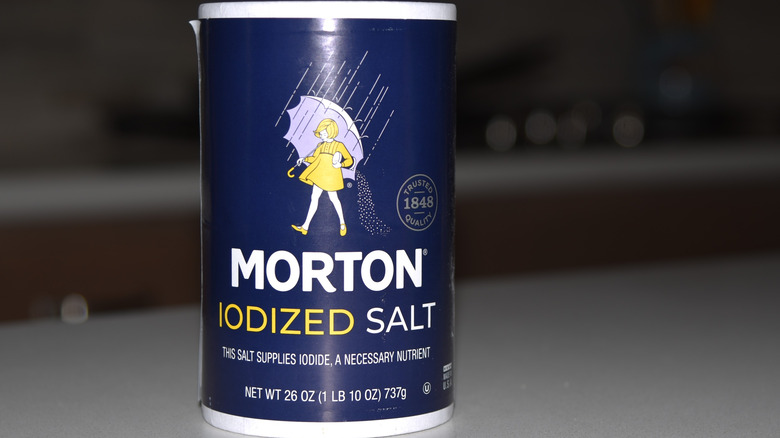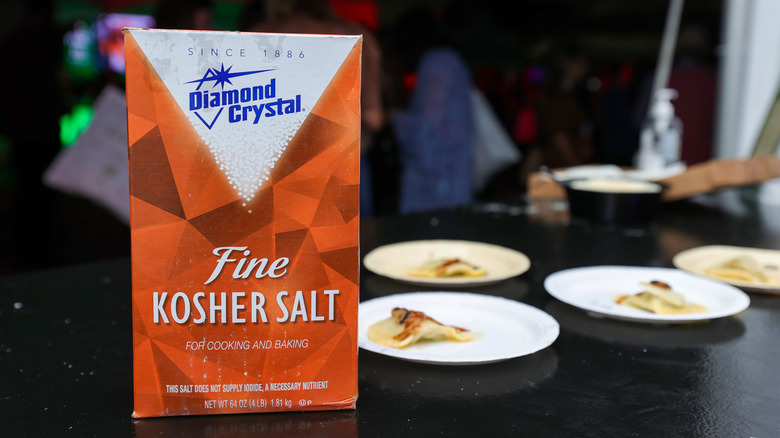Morton's Vs. Diamond Crystal Kosher Salt: What's The Texture Difference?
Just the right pinch of salt can amplify not only meals but also enhance drinks. Salt can turn up the volume of a dish when masterfully added — or can just as easily overwhelm a recipe when carelessly misplaced. The problem for aspiring chefs is the sheer number of salt choices in supermarket aisles. From exotic-looking varieties to chunkier textures, knowing which salt to use in your at-home recipes can be overwhelming. Even within one particular type of salt category, there are several options to choose from.
Take kosher salt, for example. This kind of salt is everywhere and seems to be used in everything. Head to the salt aisle, and you'll see Morton's and Diamond Crystal brands stocking the shelves. Does it matter, really, if you choose the red box or the blue box of salt for tonight's recipe? Actually, it does, and we're here to help you understand why.
A denser seasoning
As Forward notes, "If you like to cook, you probably have a box of Morton or Diamond kosher salt in your cupboard, and if you are a chef, a small mountainous peak is likely sitting in a crock that you keep within arm's reach in the kitchen at all times." We agree: salt is always one of the most tempting seasonings to add to any dish.
Be careful, however, particularly when seasoning with Morton's. Morton's is a denser salt than Diamond Crystal, and the crystals can be a bit more tactile — and tempting — to work with. Food & Wine suggests adding this kind of salt slowly and giving the salt a moment to dissolve before tasting the dish you're making. Then, if you think the recipe requires additional seasoning, add those extra pinches carefully. It's best to keep a lighter hand when adjusting for salt, especially when working with Morton's denser granules. Typically, kosher salt takes longer to dissolve than non-kosher varieties, so you won't taste the full impact immediately.
A lighter touch
Diamond Crystal differs from Morton's not by ingredient, but by shape. In 1886, Diamond Crystal Salt unveiled a new process for salt-making, resulting in uniquely-shaped crystals that could be easily mixed into recipes (via Diamond Crystal Salt). Food & Wine describes Diamond Crystal salt as having a lighter, more crumbly texture than Morton's. Because the granules are smaller, they will dissolve more quickly into recipes and will be easier to detect earlier on in the cooking process. If you're measuring salt according to weight, no problem, but if you are distributing according to volume, you'll need to make some adjustments, notes Simply Recipes.
America's Test Kitchen likes the "pinchability" factor of the Diamond Crystal brand and notes the salt can easily be crushed and distributed by hand. Diamond Crystal salt also sticks nicely to foods like steak or vegetables, which, according to Forward, is actually the opposite of what kosher salt is meant to do. However, it does make for easier cooking.
Whatever you choose to stock in your kitchen, you have options. Salt wisely.


